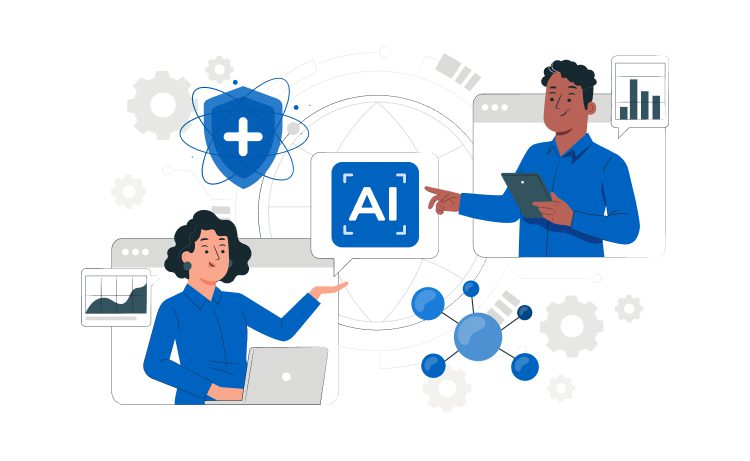
How to Meet AI Challenges in Healthcare?



Implementing AI in healthcare brings transformative benefits, such as enhanced diagnostic accuracy, personalized treatments, and improved operational efficiency, leading to better patient outcomes and satisfaction. However, it’s important to remember that despite the numerous benefits, implementing new technologies comes with its own set of AI challenges in healthcare. This article will describe the key challenges of implementing AI in healthcare and how to overcome them.
Content
Exploring the latest statistics reveals the impact and growth of AI in healthcare. A recent report by Grand View Research indicates that the global AI in healthcare market size is approximately USD 10.4 billion in 2021 and is expected to grow at a CAGR of 38.4% from 2022 to 2030.
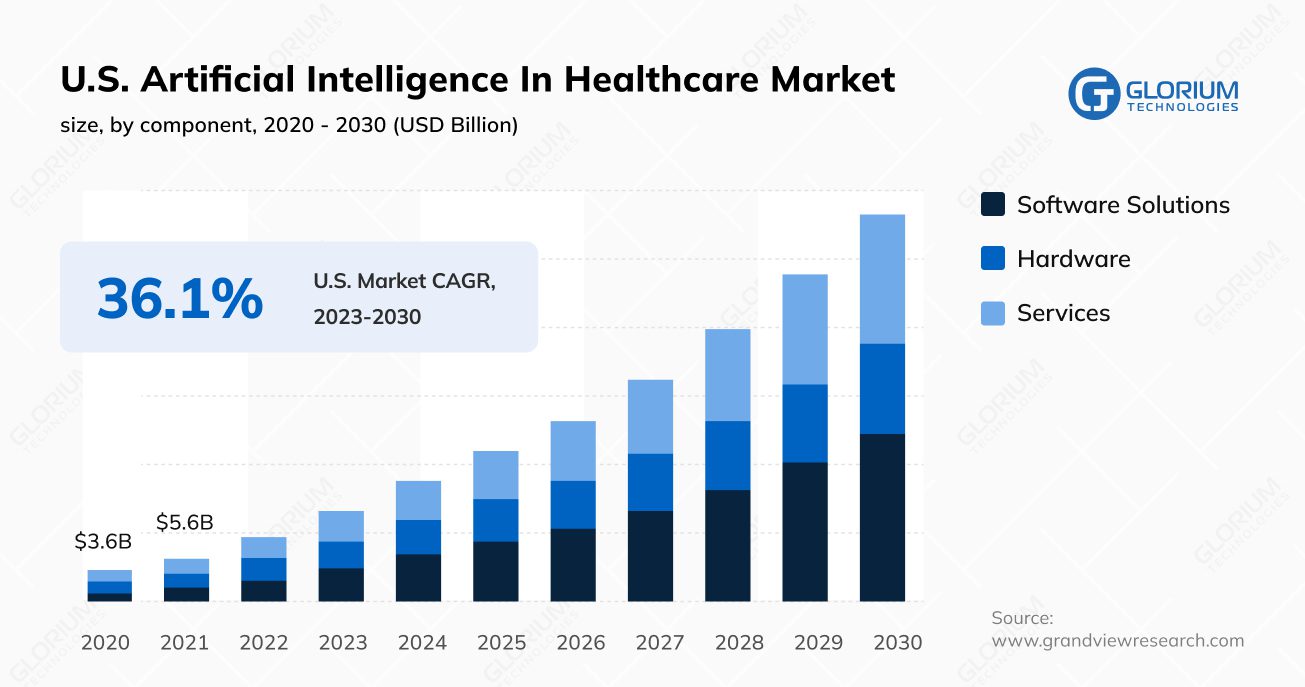
The integration of AI in healthcare is driven by the increasing need for more efficient and accurate medical services, coupled with the growing volume of healthcare data.
This growth is fueled by AI’s ability to analyze large datasets, improve diagnostic accuracy, personalize patient care, and optimize operational efficiencies in healthcare settings. Are you interested in the latest statistics and insights on AI in healthcare? Dive deeper into the world of AI in healthcare.
The current landscape of AI in healthcare is marked by rapid growth and significant advancements, reflecting the increasingly pivotal role of AI technologies in transforming medical practices and patient care.
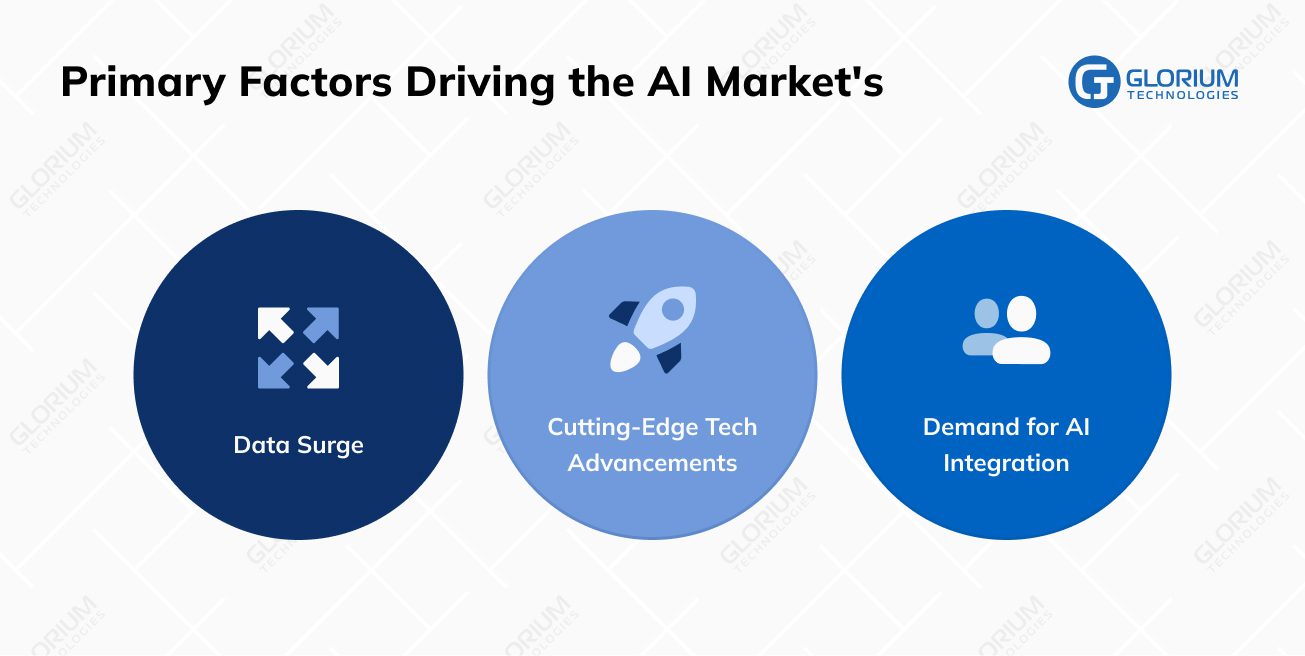
According to the study by McKinsey, which was made among businesses that implemented AI and ML technologies, 63% of companies stated that AI and ML boosted revenues, 65% of employees reported enhanced experiences due to AI, and 67% of respondents noticed that AI technologies elevated the customer experience.
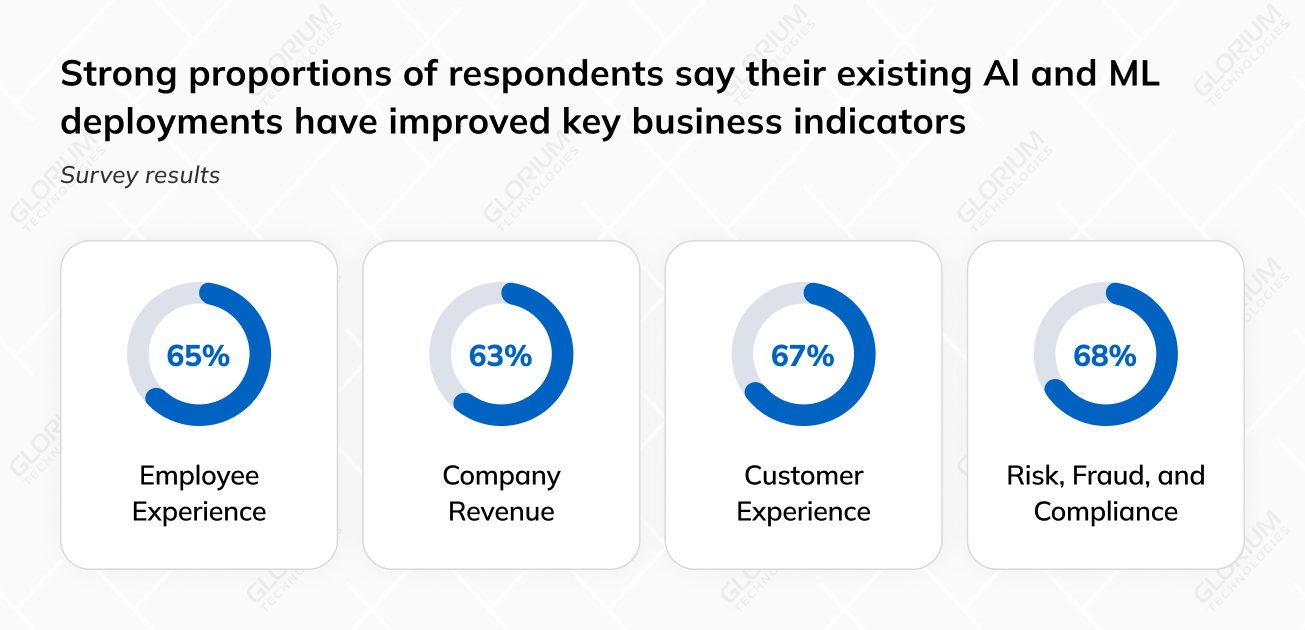
AI algorithms are revolutionizing how medical conditions are detected and diagnosed. These advanced systems can interpret medical images, such as X-rays and MRIs, with precision and speed that surpass traditional methods, making early and accurate detection of diseases like cancer and diabetes more achievable than ever before.
AI’s influence extends deeply into treatment planning, which facilitates the creation of personalized healthcare strategies.
By analyzing a wealth of patient data, including medical histories, genetic information, and lifestyle factors, AI guides clinicians in devising the most effective treatment approaches. This is particularly transformative in areas like oncology, where AI can tailor chemotherapy protocols to individual patients, greatly enhancing treatment efficacy.
The drug development and discovery field is also reaping the benefits of AI, which accelerates the identification of new drug candidates by efficiently sifting through extensive biological data. This speeds up the drug discovery process and opens up new avenues for more targeted and potent pharmaceuticals.
AI is a game-changer in managing hospital operations and administration, streamlining processes from patient appointment scheduling to hospital bed management. This optimization reduces costs, improves patient experiences, and more efficient healthcare delivery.
Patient engagement and monitoring are being reinvented with AI-driven applications and wearable technologies. These tools offer continuous health tracking and personalized health advice, enhancing patient adherence to treatment plans and promoting proactive health management. Telehealth, a rapidly growing sector, has been significantly bolstered by AI, offering remote diagnosis and consultation capabilities. AI-powered platforms provide patients with immediate medical advice, making healthcare more accessible and efficient.
Lastly, AI is refining the clinical trial process, improving everything from patient recruitment to data analysis, thereby enhancing the efficiency and effectiveness of these crucial studies.
The implementation of AI in healthcare, while promising, comes with significant challenges of AI in healthcare that must be addressed to harness its potential fully. Among the most pressing challenges are data privacy and security issues, integration with existing systems, and regulatory compliance.
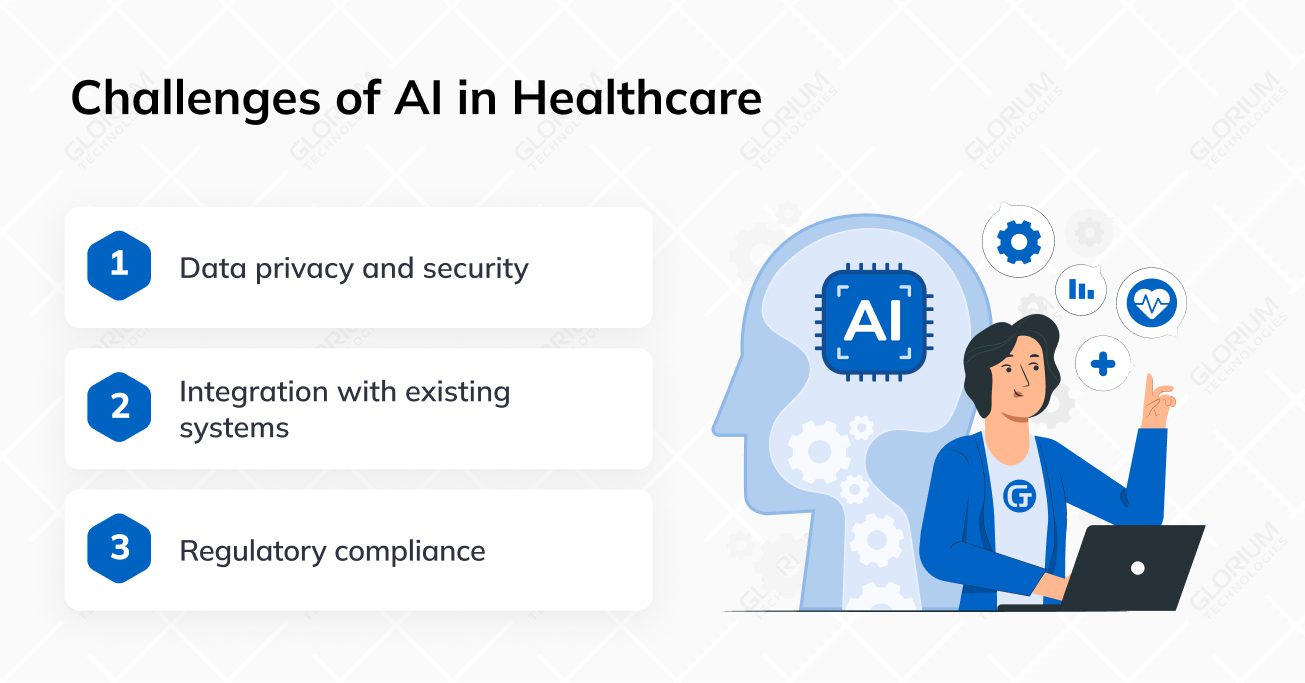
Data privacy and security
The sensitive nature of healthcare data makes its security paramount. AI systems often require access to big amounts of personal health information, including medical histories, genetic data, and treatment records. Ensuring this data’s confidentiality, integrity, and availability is critical, especially in an era where cyber threats are increasingly sophisticated.
The challenge lies in developing AI solutions that can leverage this data for advanced analytics and personalized care while implementing stringent security measures to protect against breaches and unauthorized access. This involves technological solutions, robust policy frameworks, and continuous monitoring to safeguard patient privacy.
Integration with existing systems
Another major hurdle is the integration of AI technologies with legacy healthcare systems. Many healthcare providers use outdated software and infrastructure that are not readily compatible with the latest AI tools. Integrating AI into these systems poses technical challenges and often requires significant investments in upgrading existing IT infrastructure. Additionally, there’s the need for seamless data exchange between
AI applications and existing electronic health records (EHR) systems ensure data is accurately and efficiently shared and interpreted. This integration must be executed without disrupting ongoing healthcare services, making it a complex task for AI developers and healthcare providers.
Regulatory compliance
Navigating the labyrinth of healthcare regulations is another critical challenge. Healthcare is one of the most heavily regulated sectors, with rules varying significantly across regions and countries. AI developers must ensure that their solutions comply with many laws and standards, including patient privacy (like HIPAA in the United States), data protection (such as GDPR in the European Union), and medical device regulations.
These regulations are often complex and can be subject to change, requiring AI solutions to be adaptable and compliant with the latest regulatory requirements. Moreover, as AI in healthcare is a relatively new domain, some regulations may still need to be fully adapted to AI’s unique challenges and capabilities, leading to potential uncertainties and the need for ongoing legal vigilance.
We will explore practical solutions and best practices that ensure successful integration, addressing critical issues such as data security, system compatibility, and regulatory compliance.
So what strategies do you need to encompass innovative solutions for data privacy, seamless system integration, strict adherence to regulations, and measures to mitigate bias, ensuring our AI tools are practical and ethical? At Glorium Technologies, we prioritize healthcare data security by employing state-of-the-art encryption and data anonymization techniques.
Our AI solutions are designed with built-in security features that guarantee protection of sensitive information from unauthorized access and cyber threats. We use advanced encryption protocols to safeguard data both in transit and at rest, and our systems undergo regular security audits to identify and rectify potential vulnerabilities. Furthermore, we implement robust access controls, thereby maintaining the highest data privacy and security standards.
Roman MatsukovProduct Manager, Glorium Technologies
Glorium Technologies has a proven track record of successfully integrating AI solutions into existing healthcare systems. Our approach involves conducting thorough assessments of the existing IT infrastructure of healthcare providers and developing customized integration plans. We have worked on multiple projects where our AI tools have been seamlessly integrated with legacy systems, enhancing their functionality without disrupting ongoing operations.
Our last case study streamlines hospital operations by automating the distribution and management of studies for radiologists. Utilizing its AI engine, the application prioritizes exams by SLA requirements, matches them with appropriately skilled doctors based on their preferences, and assigns each exam to the best-suited expert. This ensures an equitable distribution of work, effectively balancing the workload among radiologists to align with their agreed-upon commitments.
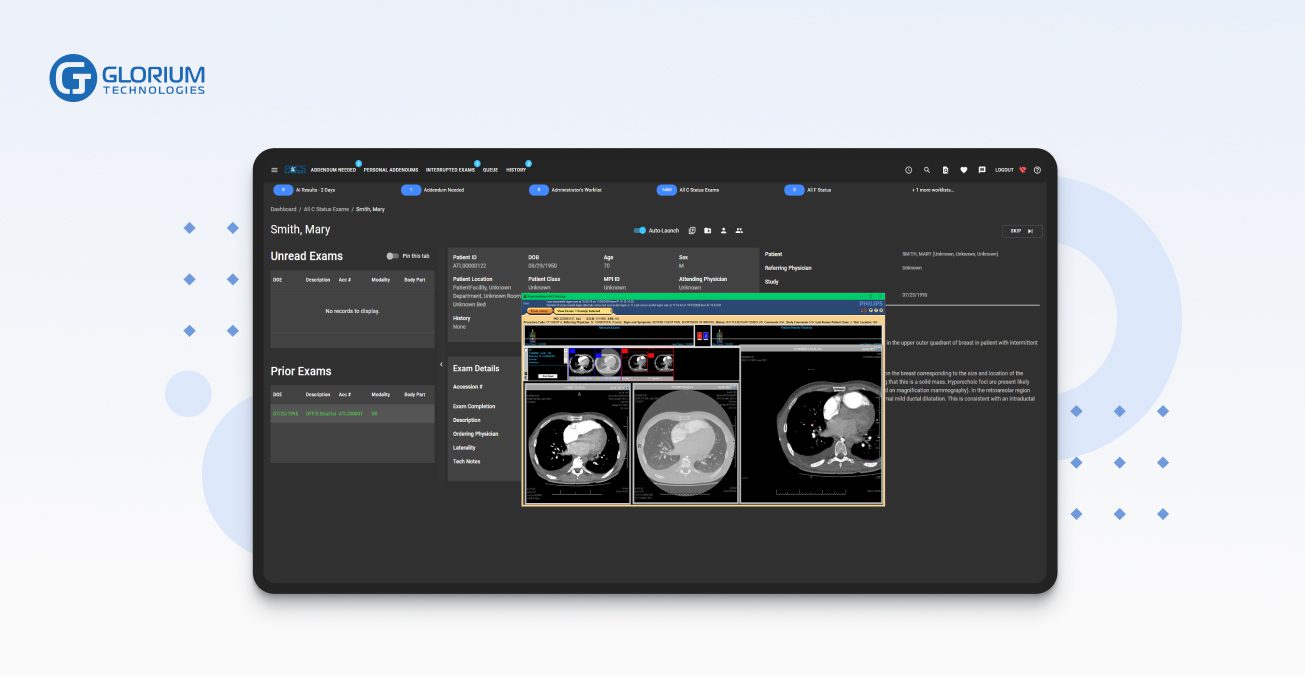
Compliance with healthcare regulations is a cornerstone of our development process. Glorium Technologies is committed to staying abreast of the evolving regulatory landscape in healthcare. Our team ensures that all our AI solutions comply with relevant local and international laws, including HIPAA, GDPR, and other regulatory standards. We have experience navigating complex healthcare regulations to ensure our solutions meet all compliance requirements. This commitment to regulatory adherence ensures legal compliance and builds trust with our clients and end-users.
Addressing these challenges is vital, as the journey of AI in healthcare is only just beginning. As AI continues to evolve, so AI role in enhancing healthcare outcomes and streamlining medical processes becomes increasingly vital, highlighting the need for continuous innovation and expertise in this domain. According to Markets and Markets, the global AI market forecast is projected to be 1.345.2 billion by 2030.
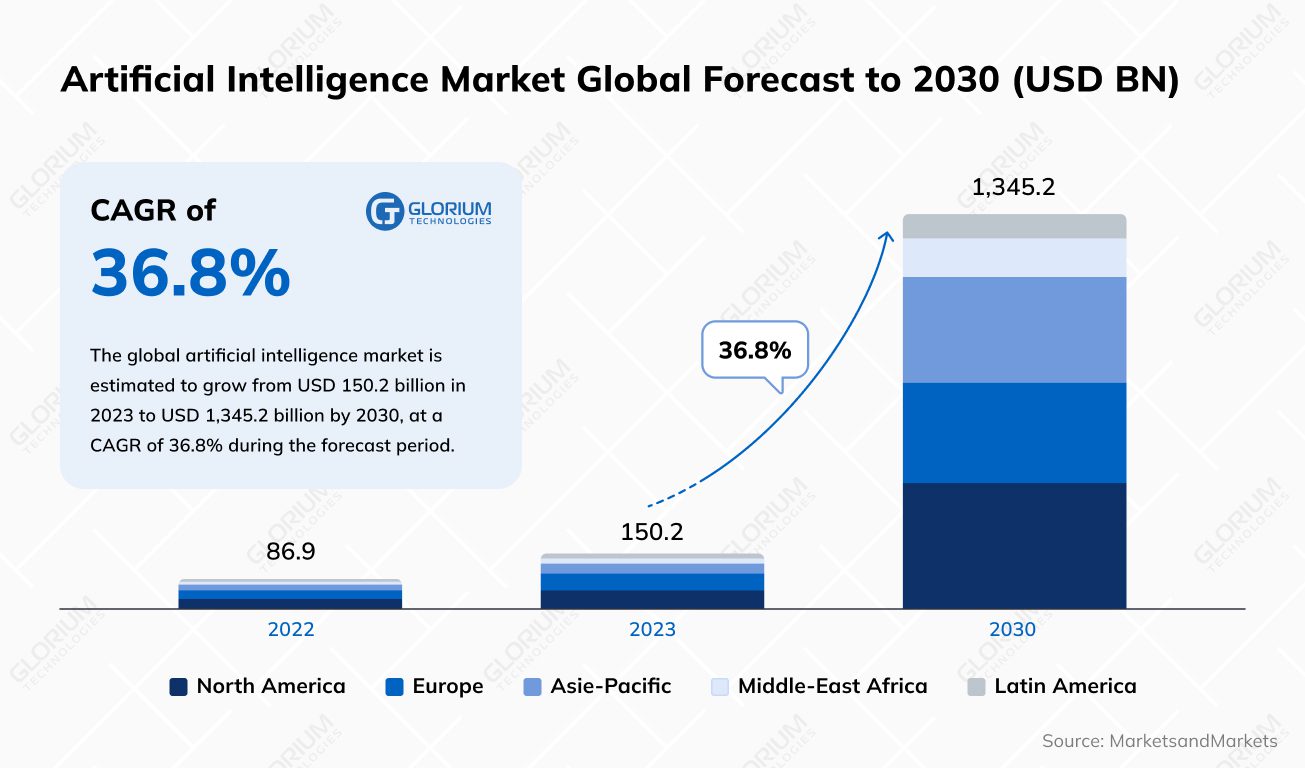
The article outlines significant challenges in AI healthcare integration, including data privacy and security, system integration, regulatory compliance, and bias mitigation. It underscores the importance of addressing these challenges to leverage AI’s full potential in healthcare. Glorium Technology’s approach to overcoming the challenges in
AI healthcare integration is multifaceted and deeply rooted in our commitment to innovation, compliance, and ethical responsibility. Our tailored solutions in data privacy, system integration, regulatory adherence, and bias mitigation reflect our dedication to advancing healthcare through responsible and effective AI development.
Keep the complexities of AI in healthcare from holding you back. Contact our managers today to discover how our AI solutions can revolutionize your healthcare services.

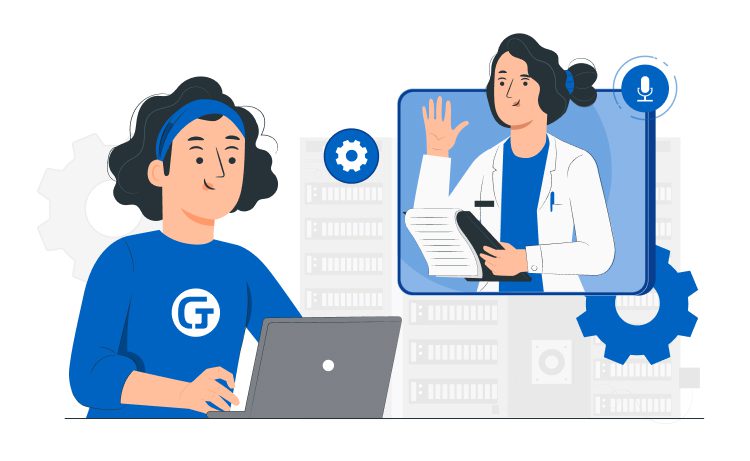
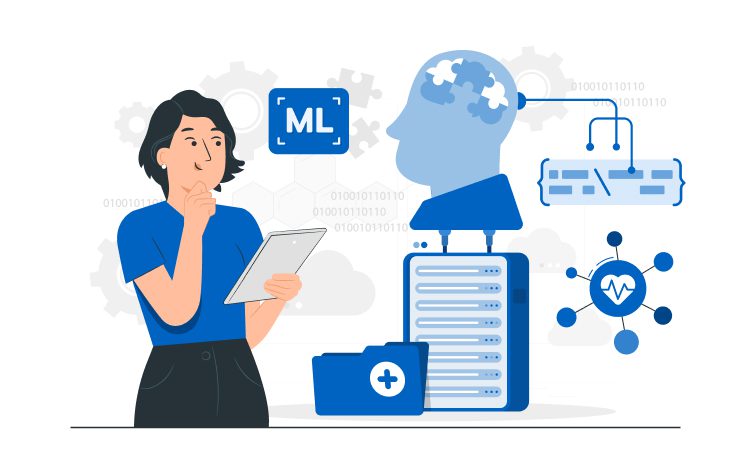
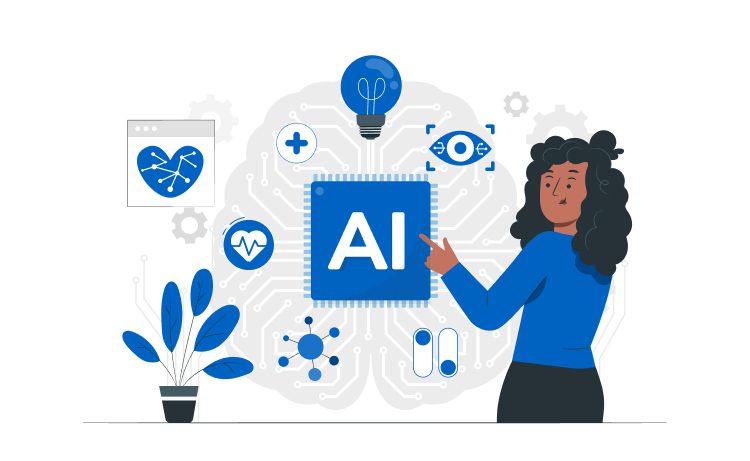
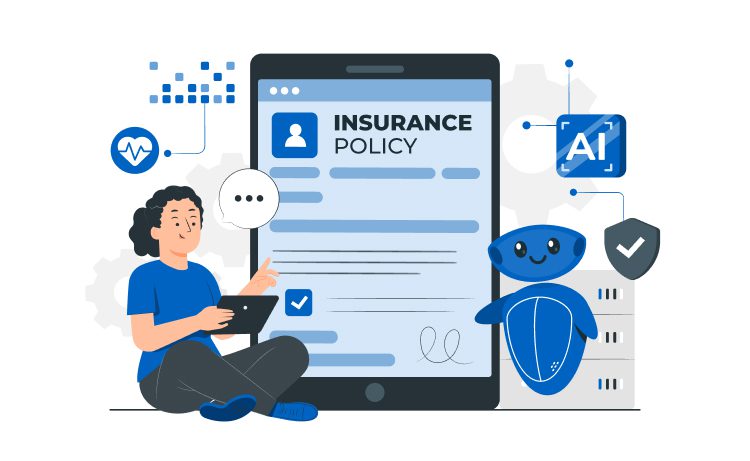
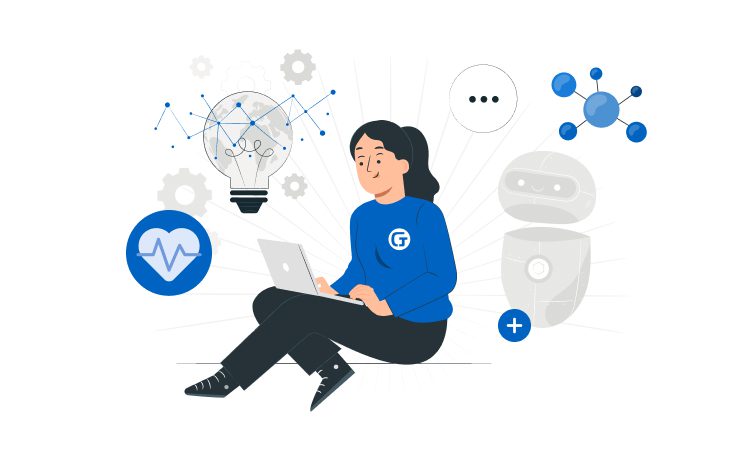

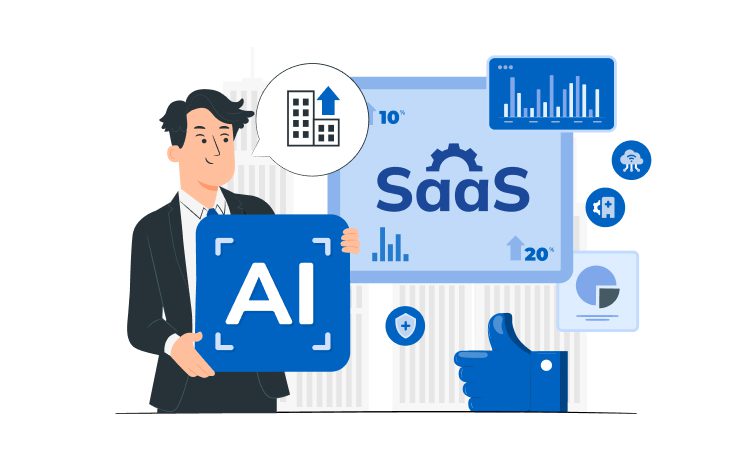
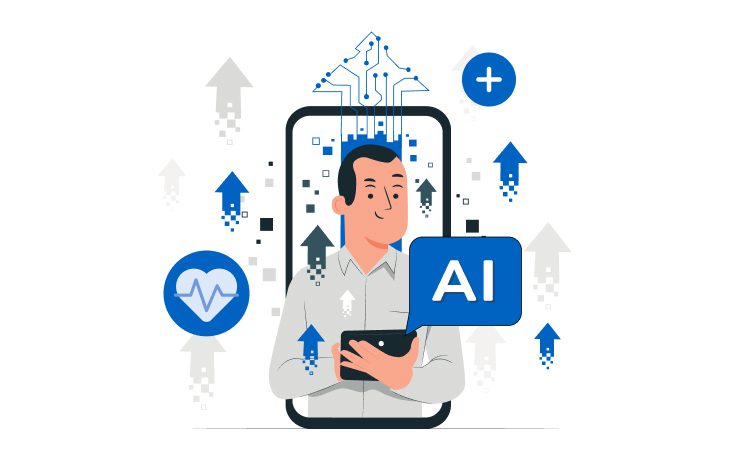
| Cookie | Duration | Description |
|---|---|---|
| cookielawinfo-checkbox-analytics | 11 months | This cookie is set by GDPR Cookie Consent plugin. The cookie is used to store the user consent for the cookies in the category "Analytics". |
| cookielawinfo-checkbox-functional | 11 months | The cookie is set by GDPR cookie consent to record the user consent for the cookies in the category "Functional". |
| cookielawinfo-checkbox-necessary | 11 months | This cookie is set by GDPR Cookie Consent plugin. The cookies is used to store the user consent for the cookies in the category "Necessary". |
| cookielawinfo-checkbox-others | 11 months | This cookie is set by GDPR Cookie Consent plugin. The cookie is used to store the user consent for the cookies in the category "Other. |
| cookielawinfo-checkbox-performance | 11 months | This cookie is set by GDPR Cookie Consent plugin. The cookie is used to store the user consent for the cookies in the category "Performance". |
| viewed_cookie_policy | 11 months | The cookie is set by the GDPR Cookie Consent plugin and is used to store whether or not user has consented to the use of cookies. It does not store any personal data. |